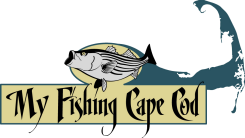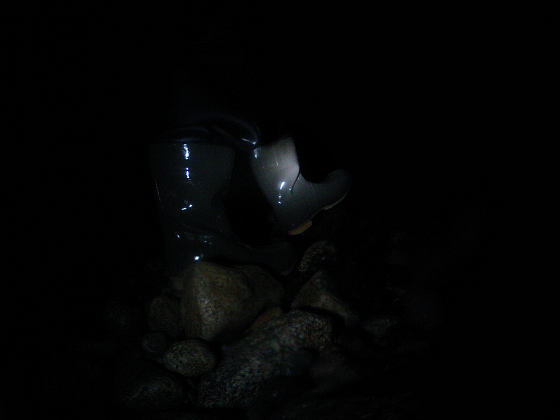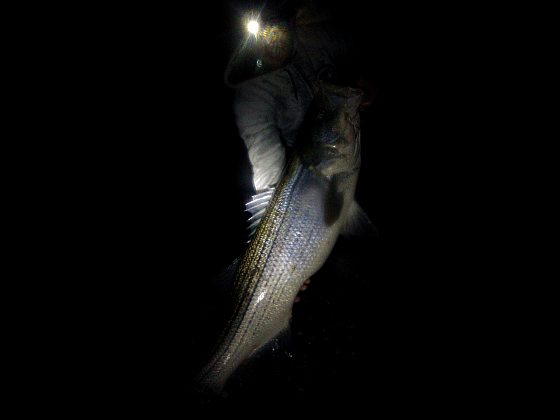According to geologists, Cape Cod's beaches were formed some 15,000 to 20,000 years ago. Who knows how many incredible blitzes have occurred along the Cape's shoreline since then. I thought about this the other night as I walked past rocks and boulders deposited by receding glaciers. How many huge stripers have fed among these rocks over the years? With no fishing pressure back then, I imagine the odds are pretty good that 100 pound fish swam right past the very rocks I was standing on.
Finding fish along the beach without the aid of technology requires a lot of patience, and more often than not, some luck. Over the course of two nights I had fished for 15 hours without a a keeper size bass, so I felt as if luck ought to kick in sometime soon. In the fishing world one never knows when the next bite is going to come. The enduring anticipation is what keeps me walking, and sometimes crawling, around boulders, and a variety of other obstructions.
So far during this trip all was quiet. There were no signs of life, aside from the slight stench of a skunk in the air. I continued walking in an effort to locate fish, as well as to avoid a confrontation with Cape Cod's stinkiest mammal.
The Hunt
The last of the lights of the waterfront homes extinguished around midnight. I turned around just in time to catch it go out. I then realized just how dark of a night it was. With no light pollution and clear skies the stars above were shimmering in all their glory. I had not seen a headlamp or any other sign of another fisherman all night long. The Cape had gone to bed.
So far my hunt for stripers was proving to be rather uneventful. Dirty, mung filled water was making life difficult. With each cast my bait returned fouled up with weed. I shone my light into the water around me and realized just how "coffee-like" it was. Brown sand and sediment were suspended throughout the water column. Any striped bass actively hunting in this area would be relying upon its lateral line and sense of smell to locate food tonight.
I didn't doubt the striper's ability to find food under these murky conditions, yet I wondered if my odds of success were going to suffer because of it. At the least my fishing time was being cut in half, due to spending a minute or two after each cast stripping weed from my line. Maybe if I continued marching along the beach I would find a section of water not so inundated with sand, mud and mung.
A Change of Terrain
Squeezed in among Cape Cod's glacial deposited boulder fields are oasis of powder sand, cobblestone and other changes of terrain. You may walk for a mile or more over the same terrain, then turn a corner and encounter a completely different environment.
At around 1AM I noticed that each step I took created a grinding-crunch noise I hadn't previously been hearing. I flipped my headlamp on and noticed that I was walking on golf ball to tennis ball-size rocks. There was even a small stretch of sand in front of me which extended into the ocean.
This was my final fishing destination of the evening. I had hoped to encounter bass before arriving here, yet hopes and wishes don't catch fish. Since I hadn't yet caught a fish I had arrived at the spot a little earlier than expected. The best tide was still an hour an half away, yet I figured I might as well start casting.
They're Here
I was disappointed with my first cast when I felt a heavy, dead weight on the end of my line, indicative of a clump of weed. Apparently the weeds I had hoped to avoid were sitting just offshore in this particular area. "So much for clean water" I remember thinking to myself. At this point I had no other choice but to deal with it. I had walked this far and was not about to give up. I'd just have to take my time and deal with the weed.
My second cast produced much of the same. As optimistic as I usually am, I couldn't help but wonder if I had made the wrong decision by fishing this area. Due to past experience I believed there to be bass in the area, yet had past success clouded my judgement in the present moment?
My third cast landed with a loud PLOP! about 30 yards out. I let the bait sit still for a moment, hoping that any fish in the area would grab it before it became fouled with weed. After a pause of several seconds I began my retrieve, anticipating a solid bite, yet realistically not expecting one.
A third of the way through the retrieve I paused for a second to scratch my nose. The braid hanging down from my rod tip went limp as the bait was pushed gently towards shore by the wind. It was then that I felt a subtle pickup. My hand quickly left my nostril and returned back to the reel handle. I dropped my rod tip and I waited for the line to come tight against the reel.
"They're here" is what I recall thinking to myself.
Fish On
I suppressed my urge to prematurely set the hook on the bass. 1-2 seconds later I felt a solid jerk as the fish turned and swallowed the bait. An instant later the braided line snapped tight against the spool of my reel. With a sharp swing of my rod I set up on the fish. Once the bass felt the sting of the hook she shot towards the surface, thrashing violently just 20 yards from shore.
A few moments later the bass shot back down towards the bottom, rubbing its head on the rocks before digging in and making a surge out towards sea. The drag on the reel began to sing and my spinning rod doubled over under the weight of what I knew was a good bass.
I dug my boots into the small rocks beneath my feet for footing and did my best to keep the fish up off the bottom, away from any sharp barnacles and other line-snapping pieces of structure in the area.





